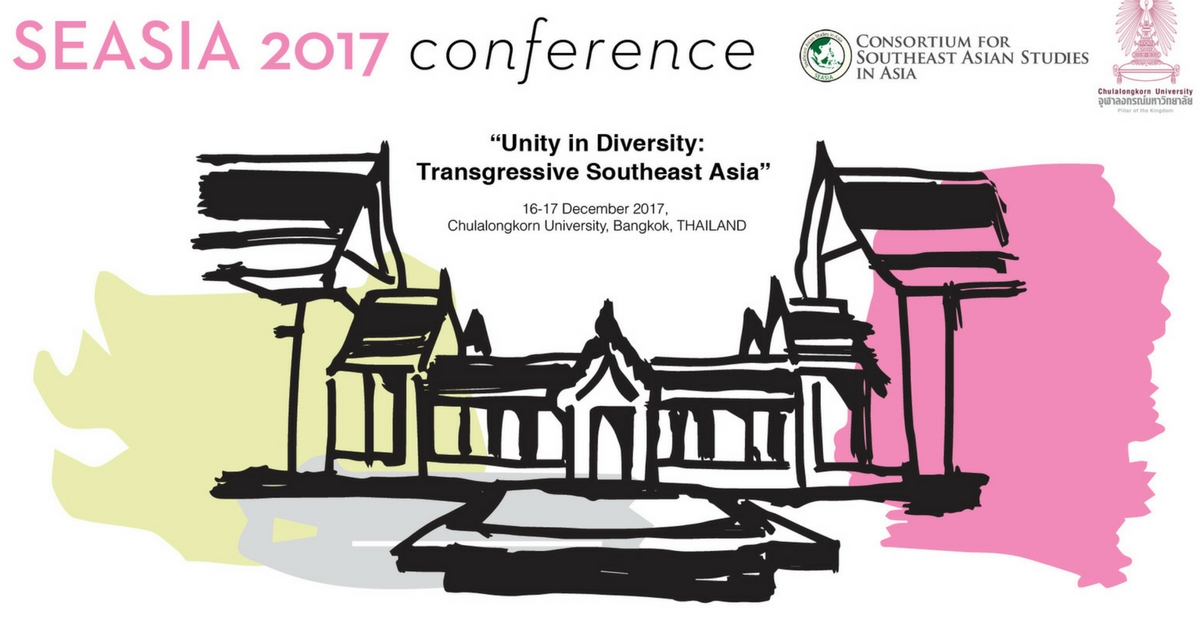 Photo: Grabbed from SEASIA 2017 conference website.
Photo: Grabbed from SEASIA 2017 conference website.
The Consortium for Southeast Asian Studies in Asia will be holding the second Southeast Asian Studies in Asia (SEASIA) conference from 16 to 17 December 2017 at Chulalongkorn University, Bangkok, Kingdom of Thailand.
SEASIA is a biennial conference that helps promote region-based Southeast Asian studies. The first SEASIA conference was hosted by the Center for Southeast Asian Studies, Kyoto University from 12 to 13 December 2015. Chulalongkorn University is hosting this year's conference as part of their 50th anniversary.
PANELS and PROGRAM
This year’s conference features 52 panels under ten major sub-themes:
- Re-conceptualizing Region in Southeast Asia
- New Perspectives on Southeast Asian Pasts
- Southeast Asian Circulations: Conjunctures and Disjunctures
- Environment and Society
- Law and Politics
- Innovation, Technology Transfer, and Social Transformation
- Literature, Film, Media, the Arts and Cultural Studies
- Language and Linguistics
- Faith, Religion and Philosophy
- Humanitarian and Development Work
The UP Asian Center is a founding member of the Consortium for Southeast Asian Studies in Asia and a partner of SEASIA 2017 conference. Eighteen faculty, students, and alumni of the UP Asian Center are scheduled to present their research in the conference.
Of note is a panel headed by Dr. Antoinette Raquiza, program head of the UP Asian Center's Bugkos research program and member of the governing board of the Consortium.
KEYNOTE SPEAKER and GUEST of HONOR
- Her Royal Highness Princess Maha Chakri Sirindhorn of the Kingdom of Thailand will grace the opening ceremonies.
- Keynote Speaker Professor Chaiwat Satha-Anan will present a lecture, Celestial Axe: On the Politics of Naming. VIEW ABSTRACT
ABOUT THE CONFERENCE
This year’s theme, (“United in Diversity: Transgressive in Southeast Asia” brings attention to the diverse but unified transgressions in Southeast Asian area studies:
The intellectual desire to cross borders, break boundaries, engage in taboos and violate all sorts of common practice is apparent in nearly every aspect of scholarly investigation, discussion and debate that this conference aims to encourage and promote—historians question time, political scientists question state boundaries, linguists question language barriers, artists break traditions. To remain relevant in the rapidly transforming world of the globalized era, one must refuse to remain obedient to the old boundaries of the past. Southeast Asian Studies is no exception. Therefore, “Transgressive Southeast Asia” not only responds to the limitations of the main title “Unity in Diversity,” but also points toward the future of the field of Southeast Asian and Area Studies.
ABOUT THE CONSORTIUM
The Consortium for Southeast Asian Studies in Asia (SEASIA) was established in 2013 by ten of the leading area-studies institutions in Northeast and Southeast Asia to promote region-based Southeast Asian studies. The Asian Center, University of the Philippines Diliman is one of the ten members of the Consortium for Southeast Asian Studies in Asia.
SEASIA enables scholars who live and research within or close to the region to come together for regular meetings without the added expense of traveling outside of the region. The consortium also welcomes close linkages with institutions based outside the region and encourages scholars from different regions of the world to participate in the common endeavor of enriching knowledge of Southeast Asia and sharing this knowledge with the world.
The secretariat of the Consortium is based at the Center for Southeast Asian Studies, Kyoto University. To learn more about the Consortium, please visit the SEASIA website.
The UP Asian Center offers M.A. degrees in Asian Studies with four fields of specialization: Northeast Asia, Southeast Asia, South Asia, and West Asia. The Center also has an M.A. program in Philippine Studies that allows students to major in Philippine society and culture, Philippine foreign relations, or Philippine development studies. The Center offers a Ph.D. program in Philippine Studies in conjunction with the College of Arts and Letters and the College of Social Sciences and Philosophy. Get an overview of these programs. The Asian Center also houses a peer-reviewed, open-access journal, Asian Studies: Journal of Critical Perspectives on Asia. It has published several books and monographs, and hosts or organizes various lectures and conferences.

